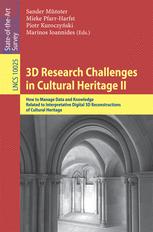

Most ebook files are in PDF format, so you can easily read them using various software such as Foxit Reader or directly on the Google Chrome browser.
Some ebook files are released by publishers in other formats such as .awz, .mobi, .epub, .fb2, etc. You may need to install specific software to read these formats on mobile/PC, such as Calibre.
Please read the tutorial at this link: https://ebookbell.com/faq
We offer FREE conversion to the popular formats you request; however, this may take some time. Therefore, right after payment, please email us, and we will try to provide the service as quickly as possible.
For some exceptional file formats or broken links (if any), please refrain from opening any disputes. Instead, email us first, and we will try to assist within a maximum of 6 hours.
EbookBell Team

4.1
50 reviewsThis book reflects a current state of the art and future perspectives of Digital Heritage focusing on not interpretative reconstruction and including as well as bridging practical and theoretical perspectives, strategies and approaches. Comprehensive key challenges are related to knowledge transfer and management as well as data handling within a interpretative digital reconstruction of Cultural Heritage including aspects of digital object creation, sustainability, accessibility, documentation, presentation, preservation and more general scientific compatibility. The three parts of the book provide an overview of a scope of usage scenarios, a current state of infrastructures as digital libraries, information repositories for an interpretative reconstruction of Cultural Heritage; highlight strategies, practices and principles currently used to ensure compatibility, reusability and sustainability of data objects and related knowledge within a 3D reconstruction work process on a day to day work basis; and show innovative concepts for the exchange, publishing and management of 3D objects and for inherit knowledge about data, workflows and semantic structures.